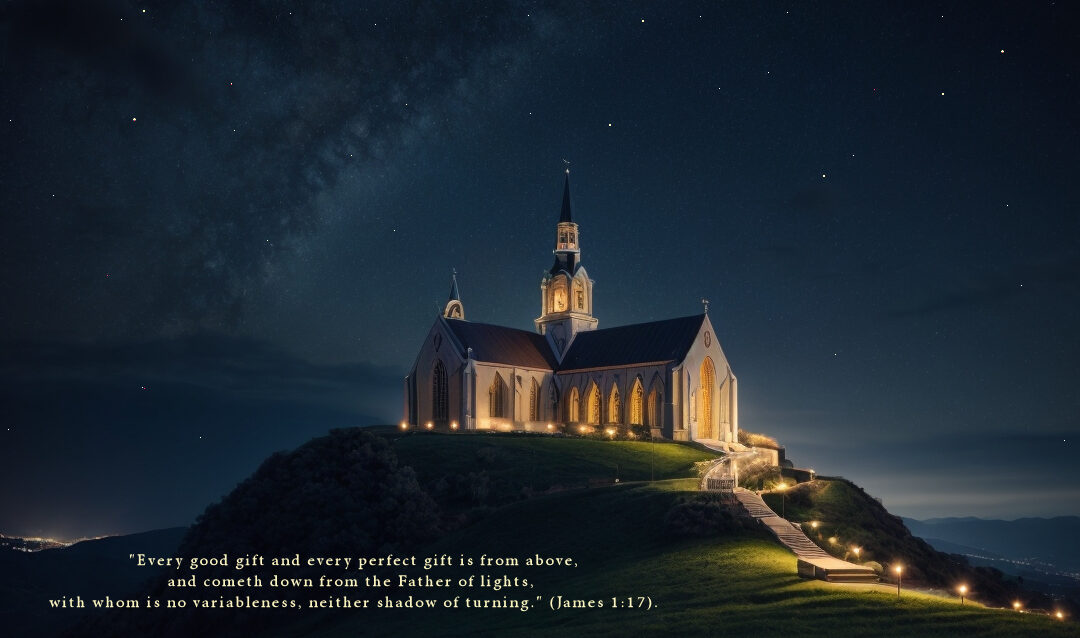“Every good gift and every perfect gift is from above, and cometh down from the Father of lights, with whom is no variableness, neither shadow of turning.” (James 1:17)
Throughout Scripture God is called by many names. Some of the more common names for God include Yahweh (Jehovah), Adonai (Lord, Master), Elohim (God), and El Elyon (The Most High God). But this reference in James to God as the Father of lights is the only place this particular description for God is found.
The Apostle John writes in his first epistle that “God is light,” (1 John 1:5, see also Rev. 22:5). And Paul describes God as one who “dwells in unapproachable light,” (1 Tim. 6:16). In contrast to the darkness of sin and evil, God is holy and righteous. He represents all that is good and just. And his essence is that of pure, clarifying, illuminating light.
So naturally, as light, God is the source of all light. At creation he said, “Let there be light,” (Gen. 1:3-25). He separated the light from the darkness, created the “greater light” to rule the day, the “lesser light” to rule the night, and hung the star lights in the night sky.
This “greater light” has its parallaxes. That is, in the East it looks one way, in the South and West another way. It “rises” and “sets.” And depending on the season, the sun’s rays are either closer or further away. God’s light, on the other hand, does not come and go; it does not move one way or another. For the light of God is perfect, true, and unchanging.
This Father and source of all light sent forth his Son in due time, whom Malachi referred to as “the sun of righteousness,” (Mal. 4:2). The coming of Christ the Messiah is depicted as a sunrise, “Arise, shine, for your light has come, and the glory of the Lord has risen upon you,” (Isa. 60:1). John the apostle refers to Christ numerous times as “the light of the world,” (John 1; 8:12). And Luke characterizes him not only as “the glory of the people of Israel,” but also “a light to lighten the Gentiles,” (Luke 2:32).
As John Tombes rightly said, “Christ is the true light… the original light, from whom other delegated lights borrow their light.”[1] At the birth of John the Baptist, his father Zacharias described so beautifully the effectual power of this light of Christ: “Through the tender mercy of our God, whereby the dayspring from on high has visited us, to give light to them that sit in darkness and in the shadow of death, to guide our feet into the way of peace,” (Luke 1:78-79).
All those who have been “visited by this dayspring from on high,” will for all eternity “shine forth as the sun in the kingdom of their Father,” (Matt. 13:43). And there, in his presence, the sun will no longer be our light by day nor the moon our light by night, “for the Lord will be unto thee an everlasting light, and thy God thy glory!” (Isa. 60:19).
Contemplations:
- Lord, thank you for sending your Son, the true light, into the world so that when I sat in darkness and in the shadow of death, you chose to visit me, to lead me out of the darkness and into the light of your love.
- In John 8:12 Christ declares, “I am the light of the world.” Your light is the true light and as such can never be extinguished. And whoever follows you shall be directed aright in his way; he will be guided in the way of peace (Luke 7:79). Your light leads us in paths of righteousness, for you are the light of life, the true and living way.
- You are the true light, the light that dispels all darkness. For you, Lord, are light, and in you there is no darkness at all. Your light is of such brilliance and glory that, in truth, it is unapproachable.
Further References for James 1:17:
Mal. 3:6; 1 John 1:5; Num. 23:19; Psalm 102:27
[1] John Tombes, True Old Light Exalted above Pretended New Light, Or, Treatise of Jesus Christ as He Is the Light Which Enlightens Every One That Comes into the World: (London: A.M., 1660), 10.


